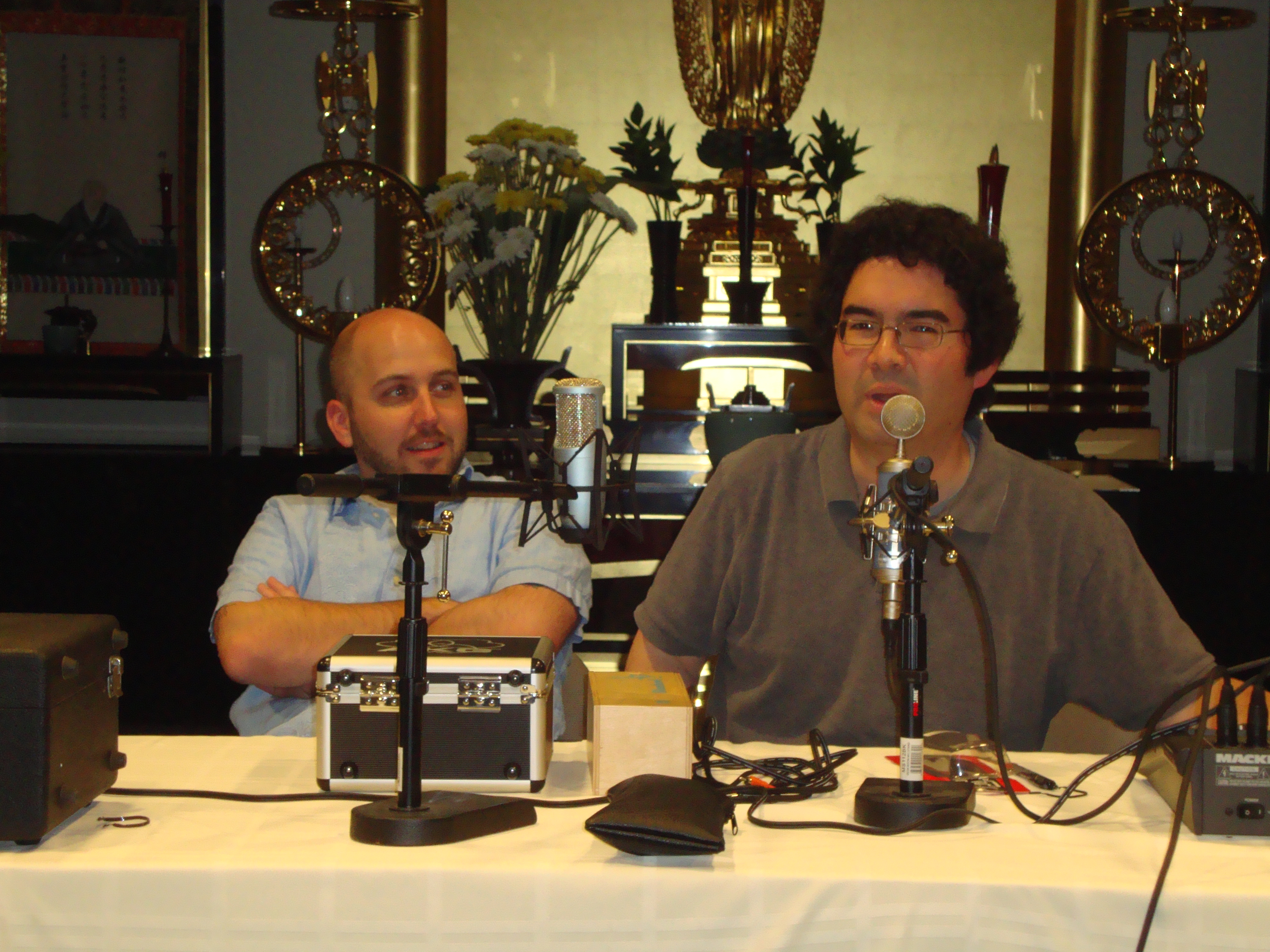In part of three of the live show series, our first question has to do with Shin Buddhism’s stance on aborted fetuses. Scott cleverly ducks the question but Harry provides some interesting insight into the Japanese ritual of mizuko kuyo (water baby ceremony) and the efficacy of ritual in Shin Buddhist context. Our second question is the ever-popular, if you had shinjin, would you know? Or, more specifically, given our deluded state as foolish beings, is it even possible to attain shinjin in this life. We both say yes (doctrinally, it has to be possible!), but provide some nuance to what shinjin is all about in the first place — a process, a relational state between the self and Amida’s compassion, like being in love — and we round it off with a good discussion of Shin Buddhism being a Buddhism of failure.
Podcast: Play in new window | Download (Duration: 24:10 — 27.7MB) | Embed
Subscribe: Apple Podcasts | RSS


Hey guys, I’ve been enjoying the live podcast chapters, it’s an interesting way to change the format a little. I thought I would chime in on the Shinshu and abortion issue since, obviously, it’s something I’ve spent a lot of time researching.
Nishi Honganji does not carry out rituals to save/exorcise aborted fetuses (mizuko kuyo). Honzan is extremely clear about exactly what their reasoning is, since this is a contentious social issue. There are four primary reasons that they have stated in their official publications, which I’ll give in more or less decreasing order of importance (but they are all important):
1) Amida embraces all beings, and therefore there is no need for mizuko kuyo. Aborted fetuses are brought to the Pure Land and attain liberation just like adults do. There are no limits to Amida’s compassion, so naturally it enfolds the unborn as well as the born.
2) Rituals are completely ineffective because we are unable to muster sufficient merit on our own to actually change the supernatural destiny of living beings. Only Amida is pure enough and has a sufficiently large storehouse of merit to over-ride the workings of karma and effect the liberation of the living and the dead. Thus all Shinshu rituals are merely expressive of our feelings: thankfulness, reverence, humility, love, sadness, etc. It is OK to hold a funeral for an aborted fetus in order to express one’s grief and to offer a chance for attendees to hear the Dharma, but mizuko kuyo to change the afterlife situation of the fetus is futile (and, because of point one, also unnecessary). This is essentially the point Harry was making in his own words.
3) Mizuko kuyo is forbidden in the Honganji-ha tradition because it draws on Japanese cultural attitudes of the sinfulness of women and encourages fear of spirit revenge. Honzan says that rituals that discriminate against women must not be carried out by priests of the tradition, and that fear of spirits is mere superstition with no basis in either science or religion. There are no such thing as haunting ghosts (since Amida liberates all spirits) and no need to fear because Amida protects nembutsu practitioners from all supernatural danger. Fear and anxiety–the main emotions that provoke mizuko kuyo–have no place in authentic religion.
4) Mizuko kuyo is used to exploit the ignorant, scaring them into paying large fees for rituals. This form of economic manipulation via religion is totally rejected by Hongaji and considered a corrosive force in society.
So, that’s the official position. Individual priests are welcome to formulate their own opinions, but are asked not to a) represent their own opinions as those of Honganji or b) carry out mizuko kuyo in their role as Honganji priests (i.e on Hongaji-affiliated temple grounds or while wearing the robes of a Honganji priest). On the other hand, Honzan has stated that Shinshu women who do have a mizuko kuyo performed are not to be condemned, but sympathized with and explained to about the true doctrine, which obviates the need for further fear or expense.
Hi Jeff,
Thanks for the response. Coincidentally, after we recorded these episodes, I started reading your book on this subject. And as I was listening to this episode yesterday after it went live, I kept thinking how I would answer the question completely differently now! So thanks for your valuable input.
And for our listeners who are interested, Jeff’s book is called Mourning the Unborn Dead and can be found here — or, of course, you local independent bookstore or library!
Glad to be of help, Scott. Thanks for the plug for my book, by the way. Hope you’re enjoying it so far.
I was thinking about the other great questions you guys tackled in the podcast. It seems to me one of the problems with the question “can a defiled being attain shinjin within this human life” is that it is based on a false premise. The Shinshu answer is flatly no, a foolish being cannot attain shinjin, due to our unbreakable attachment and delusion. After all, shinjin is not something that we attain. Shinjin is something that we receive. It is precisely deluded, defiled, foolish beings who receive shinjin during this human lifetime, due to the workings of Other Power. Realizing the difference between attainment and reception is pretty much where the Shinshu rubber hits the road, so to speak.
The other issue that I was thinking about was the question of whether someone would realize they have shinjin. It seems to me that the problem is trying to put shinjin in a box and say that it is one thing, only one thing, and always one thing. Shinjin is in fact the same for everyone–that’s why Honen affirmed that Shinran’s shinjin was the same as his own. But sentient beings are all different from one another, with no two ever being identical. So of course there are people who will receive shinjin and realize that they have, and people who will receive shinjin and not realize that they have. Their shinjin is the same, but they are different, so naturally their understandings and experiences in life will not be the same.
Anyway, just some follow-up thoughts. It would be great if y’all were doing a live podcast in March when I’ll be town, I’d love to maybe ask a question or hear what others are curious about. I should be in Berkeley by Sunday night BEFORE the conference starts on Thursday.
Have a great weekend.
Due to the sudden interest in anti-abortion protesters feeling the need to tell us how abortion is wrong and suggesting that we’re complicit in the killing of babies, I am closing comments on this post. If you would like to comment on this particular episode from an appropriately Buddhist perspective, feel free to check out our Twitter feed or Facebook page (linked to up top).
And to the anti-abortion protesters: despite the title of this episode, it has absolutely nothing to do with your debate. We do not talk about the legal status of access to abortion in the United States; we do not talk about the morality of protecting a woman’s right to choose; and we do not discuss whether or not a fetus is “alive” in either the legal sense or in the Christian sense. The main thrust of our comments come from a specifically Japanese Buddhist and largely ritual context far removed from your debates. So. Please. Before you get angry at us for stating our opinions, do us the favor of actually listening to the episode and thinking about whether or not we’re even having the same conversation.
Thanks.